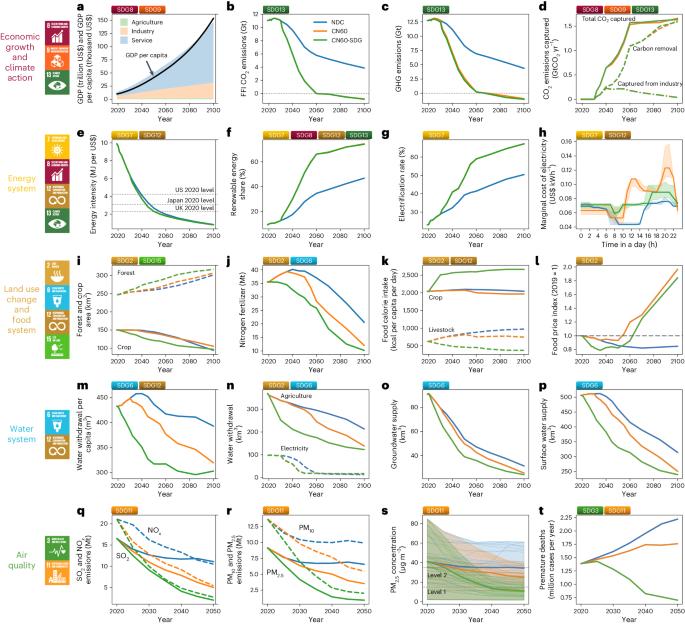Targeting net-zero emissions while advancing other sustainable development goals in China
IF 25.7
1区 环境科学与生态学
Q1 ENVIRONMENTAL SCIENCES
引用次数: 0
Abstract
The global net-zero transition needed to combat climate change may have profound effects on the energy–food–water–air quality nexus. Accomplishing the net-zero target while addressing other environmental challenges to achieve sustainable development is a policy pursuit for all. Here we develop a multi-model interconnection assessment framework to explore and quantify the co-benefits and trade-offs of climate action for environment-related sustainable development goals in China. We find that China is making progress towards many of the sustainable development goals, but still insufficiently. The net-zero transition leads to substantial sustainability improvements, particularly in energy and water systems. However, the co-benefits alone cannot ensure a sustainable energy–food–water–air quality system. Moreover, uncoordinated policies may exacerbate threats to energy security and food security as variable renewables and bioenergy expand. We urge the implementation of pragmatic measures to increase incentives for demand management, improve food system efficiency, promote advanced irrigation technology and further strengthen air pollutant control measures. The net-zero transition will bring co-benefits to various sectors but also potential trade-offs that could undermine sustainable development efforts. A study shows that in China, the co-benefits from the transition alone will not secure a sustainable energy–food–water–air quality system.

以净零排放为目标,同时推进中国的其他可持续发展目标
应对气候变化所需的全球净零排放转型可能会对能源、粮食、水和空气质量之间的关系产生深远影响。在应对其他环境挑战以实现可持续发展的同时,实现净零排放目标是所有人的政策追求。在此,我们开发了一个多模型互联评估框架,以探索和量化气候行动对中国环境相关可持续发展目标的共同利益和权衡。我们发现,中国在实现许多可持续发展目标方面正在取得进展,但仍然不够。净零过渡带来了可持续发展的实质性改善,尤其是在能源和水系统方面。然而,仅靠共同效益并不能确保能源、食品、水、空气质量系统的可持续发展。此外,随着可变可再生能源和生物能源的扩大,不协调的政策可能会加剧对能源安全和粮食安全的威胁。我们敦促采取务实措施,加大需求管理激励力度,提高粮食系统效率,推广先进灌溉技术,进一步加强空气污染控制措施。净零排放转型将为各部门带来共同利益,但也可能带来权衡,从而破坏可持续发展努力。一项研究表明,在中国,仅靠转型带来的共同利益并不能确保建立一个可持续的能源-食品-水-空气质量系统。
本文章由计算机程序翻译,如有差异,请以英文原文为准。
求助全文
约1分钟内获得全文
求助全文
来源期刊

Nature Sustainability
Energy-Renewable Energy, Sustainability and the Environment
CiteScore
41.90
自引率
1.10%
发文量
159
期刊介绍:
Nature Sustainability aims to facilitate cross-disciplinary dialogues and bring together research fields that contribute to understanding how we organize our lives in a finite world and the impacts of our actions.
Nature Sustainability will not only publish fundamental research but also significant investigations into policies and solutions for ensuring human well-being now and in the future.Its ultimate goal is to address the greatest challenges of our time.
 求助内容:
求助内容: 应助结果提醒方式:
应助结果提醒方式:


